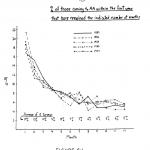The Partnership At Drugfree.org and OASAS (the New York State Office of Alcohol and Substance Abuse Services) recently released a mind-boggling piece of propaganda. To my surprise, they carried out a pretty good survey – but then completely distorted the results to push their agenda. Here’s an excerpt of Drugfree.org’s press release on the data:
Survey data released today … show that 10 percent of all American adults, ages 18 and older, consider themselves to be in recovery from drug or alcohol abuse problems.
This a devious distortion of the facts. They say that 10% “consider themselves to be in recovery“, but the exact question they asked in their survey is:
Survey Question: “Did you used to have a problem with drugs or alcohol, but no longer do?”
I know this may sound nitpicky to the uninitiated, but answering yes to that question is nowhere near the same thing as saying that you’re “in recovery.” Recovery, as defined by rehabs, addiction experts, and 12-steppers has many different definitions and connotations – all of which include far more than considering yourself free of a drug or alcohol use problem. Most commonly, recovery includes abstinence, and any moderate users are considered “relapsed”, not “in recovery.” If someone tells me they no longer have a drug or alcohol problem, it is quite possible and probable that they moderately use substances. In fact, the majority of people who were formerly classified as “alcohol dependent” become moderate drinkers! (see Dawson)
With that single point, their distortion of the facts becomes completely transparent, but that’s not all there is to recovery. Most will describe being “in recovery” as including 12-step meeting attendance, and activity helping other addicts and alcoholics. The gold standard in rehabs, The Betty Ford Clinic, describes recovery thusly:
Recovery from substance dependence is a voluntarily maintained lifestyle characterized by sobriety, personal health, and citizenship.
Let’s look at the question that survey respondents were asked one more time:
Survey Question: “Did you used to have a problem with drugs or alcohol, but no longer do?”
That question doesn’t include anything about abstinence (how Betty Ford defines ‘sobriety’ in the same document), personal health, or citizenship – yet these are all things assumed in widely popular definitions of recovery. In fact, they’re included in OASAS’s (the people who did this present survey) own damn definition of recovery which they say:
goes beyond abstinence alone to include a full re-engagement based on hope, resilience, health and wellness, and includes family, friends and community.

So, it includes abstinence, which we’ve already pointed out is not implied by the survey question, and it includes all the other garbage contained in the Betty Ford definition. There is no reasonable way to assume that people who responded to the survey question meant all of these things when they answered yes – we only know that they meant “I no longer have a problem drugs or alcohol.” To ask the question they asked and then to portray the results as they did is downright dishonest. It is willful manipulation intended to push their agenda of treatment. The people at Drugfree.org know this well, as their site is covered with the word recovery in all sorts of contexts suggesting it means much more than simply ‘no longer having a problem’ – such as when they say that moderation is “often impossible since addiction changes the physical makeup of the brain and the person in recovery is no longer able to use drugs or alcohol in a controlled fashion.”[1] In fact, on the same page they assume that everyone “in recovery” attends meetings by presenting “supportive questions” you can ask of a recovering person such as “I’d be interested in hearing how your meetings are going.”
Let’s return to a few quotes from the press release, to see their mission peppered throughout:
“These findings serve as a reminder that addiction is a treatable disease and recovery can be a reality.”
“It is my hope that this new evidence will strengthen and inspire individuals and those that provide treatment and recovery services to help the broader community understand that treatment does work and recovery is possible.”
And they go on to use the word recovery for a grand total of 34 times in the press release! It’s clear that their objective is to promote addiction treatment services and specifically the “recovery” lifestyle taught by those services (both of which are highly questionable, but that’s another topic). They dishonestly promote these services as effective by using an irrelevant survey result which indicates nothing about whether people are living the recovery lifestyle as sold by treatment centers and support groups. As my friend and colleague Dan Carter pointed out, this press release puts words in the mouths of people who said nothing more than that they no longer have a problem with drugs or alcohol.
The Kicker
The big secret here is that the majority of the 10% of americans shown to no longer have a drug or alcohol problem by this survey have probably never been to a rehab or 12-step meeting, and those who have been, probably dropped out of support groups pretty quickly – and a great portion, perhaps a majority have become moderate level drinkers. Thus even though they no longer have problems, by the most popular definitions of recovery they would clearly not be defined as being “in” it.
Now I’m not a credentialed statistician, but let’s look at some basic facts and do a little math:
- 75% of people who resolve their drinking problems have never stepped foot in a single meeting or session of formal help for “addiction.” Which leaves only 25% who have sought some type of “recovery” help. [2]
- A mere 18% of formerly “alcohol dependent” people are abstinent – while 57% are moderate users. [2]
- 95% of people who enter Alcoholics Anonymous are no longer attending meetings one year later. [3]
- Of those who have ever sought formal help, 35% are abstinent. [2]
I’m outraged by the blatant dishonesty of this press release, but impressed by the actual research done. People change and solve their substance use problems all the time – 10% of the american public has done so – through the distorted lens of these treatment organizations, this fact props up their vision – but in reality, this fact props up the message that people can and do just change, and don’t need the “recovery” and treatment system.
Are Any Of The Survey Respondents “in recovery”
Yet another twist on this data must be explored. Let’s think about people in the actual recovery culture – those who believe that all sorts of effort must be expended to avoid relapse, who attend meetings regularly and see themselves as having a lifelong disease, and refuse to refer to themselves as “recovered” (with an “ed”) and opt specifically for the verbiage “in recovery” to describe their state of being. These people, if they were consistent in their beliefs, might answer no to the question “Did you used to have a problem with drugs or alcohol, but no longer do?” Because to them, whether they’re abstinent or not, they still have a problem, and always will have a problem!

[1] In a popup box titled “6 Things You need to Know About Relapse” on the page http://www.drugfree.org/recover
[2] Dawson 2005
[3] Figure 1 – results of AA’s Triennial survey —->
[4] Note: about two thirds of americans with substance use problems have specifically alcohol use problems, while the rest have combined alcohol and drug problems or drug problems, according SAMHSA’s NSDUH series of epidemiological studies. In this section, for ease of argument I’m applying data on problem alcohol users to the total 10% referred to in this study. It’s not a perfect analysis, but the point is made, and I have little reason to believe the fate of problem drug users is much different than that of problem alcohol users.

I’ll save the 12 Steppers from writing in and cover their talking points for them:
“The things you are sayiing are killing people, Steven!”
“Why do you hate AA so much, Steven? You need to work a better program!”
“You must be full of resentments, Steven!”
“It’s a disease! AA has helped millions of people! Everybody I know knows that! I’ll prove it to you! Here: talk to my sponsor!”
Okay. That was fun!
Good work, Steven. I don’t get upset by the propaganda or surprised. Keeping people on the yo-yo of failing, “getting in recovery” and “failing again” is Big Business. It’s almost as lucrative as the drug industry, legal and illicit, itself.
I read Rational Recovery a few months back and made a commitment to quit my problem behavior and stay quit–and that was the final word on it. I practice the AVRT technique suggested in that book and do other things on my own. I’ve got other problems still, for sure, but I’m working through them the same way I worked through that past problem behavior…by learning to make better choices.
As far as I can see, “in recovery” is not a synonym for abstinence – a person who is a 12 step believer can have “relapses” and still be considered “in recovery” (since relapses are an expected part of the “recovery process”) But a person who decides on their own to just quit drinking is not “in recovery” – that person is a “dry drunk” – a mean, unhappy person who is disconnected from their feelings, not to be trusted, & can’t promise that the nonuse of alcohol/substances will continue (since by definition, no one who is alcoholic/addicted can, even 12 steppers can’t but even in light of “relapses” often being part of the “recovery” process, but 12 steppers can’t be faulted for it they way dry drunks can) It’s about whether nor not the person both believes the 12 steps & associated propaganda. Even during relapses the 12 stepper person is “in recovery”, or but someone who doesn’t buy the 12 steps & associated propaganda, and even if that person hasn’t had a drink for decades & pledges to never drink again, is not “in recovery”.
As far as I can tell, “in recovery” is about whether or not you are a pledge in the fraternal organization that is AA/NA/whateverA, or if you’re not.
Trish, I believe it all depends on the actual individual when it comes to a question of being a “dry drunk.” I also believe that one is in recovery as soon as they stop drinking/druging. I work a 12 Step program but I don’t let it control my life. I like a lot of the thought processes that are promoted in the program. I believe that I need to be thoughtful of my actions and make ammends when I’ve done wrong. To me, that means treating someone the way I would want to be treated. I guess there are some who drink the kool-aid in AA that give a lot of us a bad name.
” I believe that I need to be thoughtful of my actions and make ammends when I’ve done wrong”.
Is that what they teach in AA ? Is that really all it takes to remain sober according to a lot of u in the program ?..
Isnt that the same things youre kindergarten teacher told you back in the days, isnt that just plain common sense that most people, addicts included, deep down know to be true ?